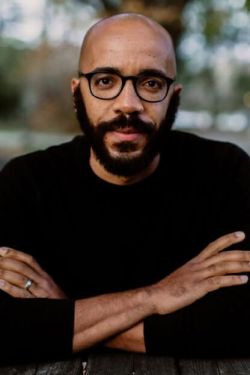In celebration of Juneteenth, Foley & Lardner welcomed Clint Smith, staff writer at The Atlantic and the #1 New York Times bestselling author of How the Word Is Passed: A Reckoning with the History of Slavery Across America, for a firmwide virtual program on June 18.

Partner Phil Phillips, senior chair of Foley's Black Attorneys Affinity Group and a member of the firm's Management Committee, introduced Smith, who holds a PhD in Education from Harvard University and has received prestigious fellowships from institutions such as the Andrew W. Mellon Foundation and the National Science Foundation. Smith's wide-ranging body of work spans essays, poetry, and scholarly articles appearing in prominent publications such as The New Yorker and The New York Times Magazine.
Smith began his presentation by talking about the inspiration for his book, which explores the physical landscapes shaped by history and the narratives that define our understanding of the world today. "Seeing confederate monuments coming down in my hometown of New Orleans," he said, "I was thinking about what museums, monuments, cemeteries, and plantations across the country are teaching the history of slavery honestly and dishonestly and somewhere in between."
Smith's research for his book, which won the National Book Critics Circle Award for Nonfiction, took him to pivotal historical sites across the United States, including Monticello, Angola Prison, and Bradfield Confederate Cemetery. He took attendees on a journey to these places, sharing his insights into the enduring impact of slavery on American society and how its legacy continues to shape contemporary inequalities.
Central to Smith's discussion was the exploration of narratives — both historical and personal — that influence our perceptions in the United States. He emphasized how stories passed down through generations shape our understanding of identity, history, and the pursuit of justice. "For so many people, history is a story they're told in which loyalty takes precedence over truth. I approached my book from a space of inquiry to understand what is behind beliefs people are carrying," he said.
As he visited historical sites across the country, Smith said he had deep and personal conversations with people he may never see again but had not had these same conversations with his family. A tour of The National Museum of African American History and Culture with his grandparents, who experienced first-hand many of the things they saw in its exhibits, provided him with the catalyst to do that.
"One of the most important realizations I had in writing this book is that slavery wasn't that long ago. There are people alive today who knew, loved, or were raised by people who were born into bondage."
Click here to learn more about Diversity, Equity, & Inclusion at Foley, and to explore how discussions like these contribute to a more inclusive workplace and society.
The content of this article is intended to provide a general guide to the subject matter. Specialist advice should be sought about your specific circumstances.


